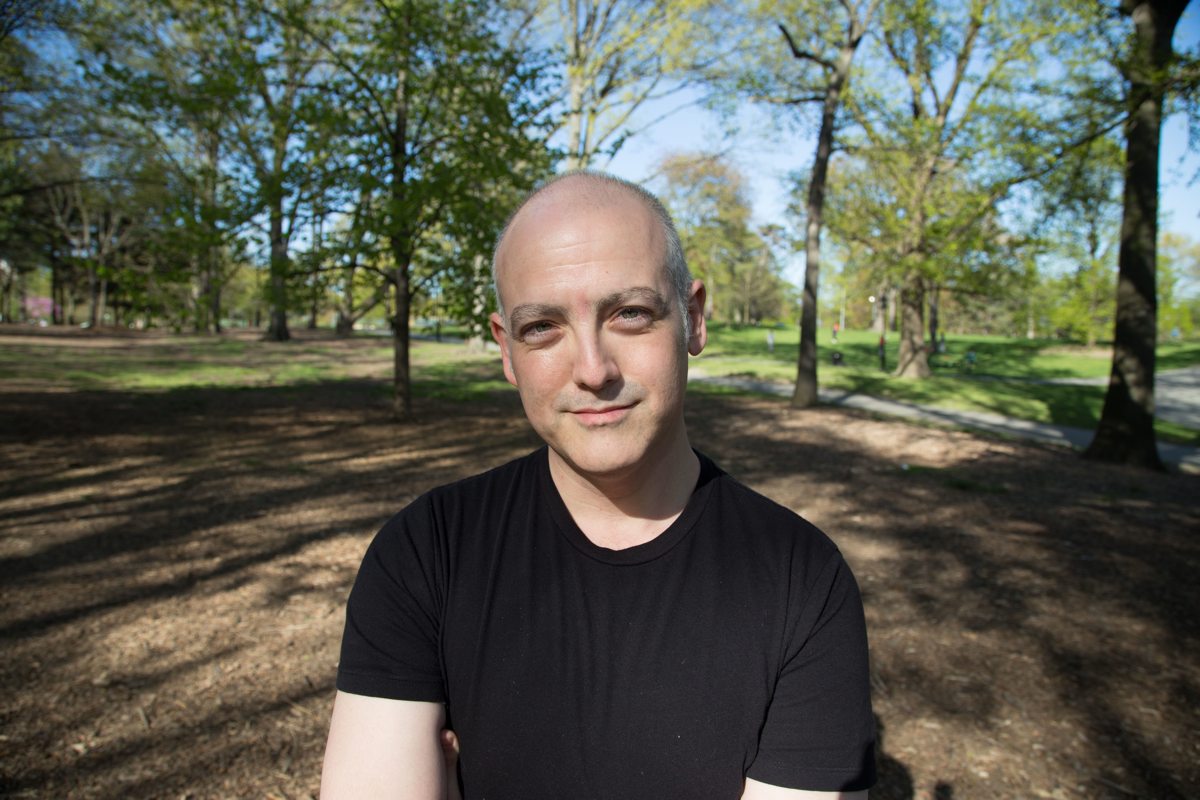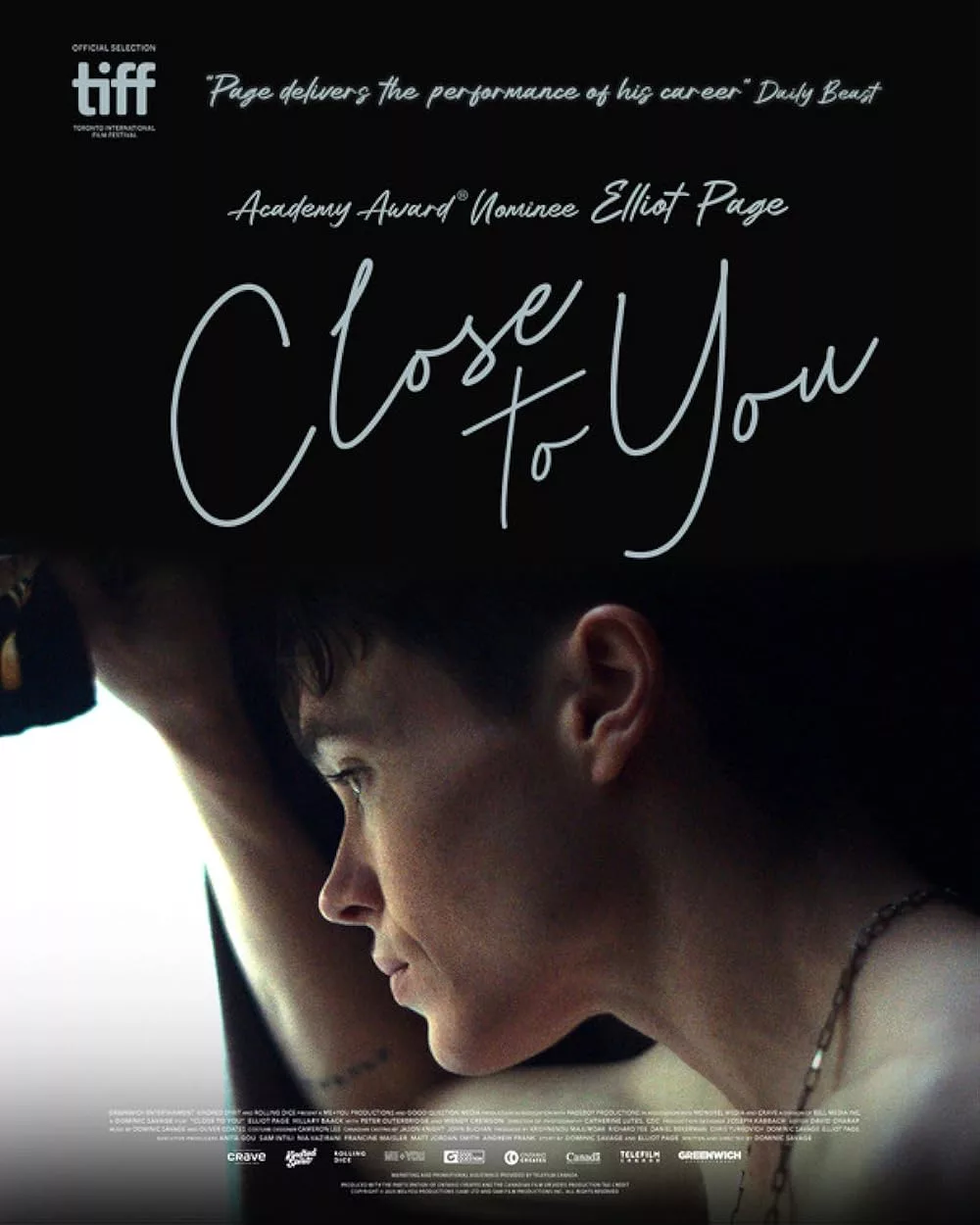There are two main types of stories about small town people finding themselves: ones where they move away from the suffocating place where they grew up, and ones where they come back. "Close to You" is the second kind of movie. Written and directed by Dominic Savage, starring Elliot Page in his first lead performance as a trans man, and based on a story that Page co-wrote, it's about a trans man going back to visit his family after four years of finding himself in a big city. It's raw and often powerful—less of a carefully shaped drama than the equivalent of a series of boxes filled with explosive material being slung about. It's less concerned with winning points for neatness than in letting scenes unfold in an unflinchingly immediate way. Sometimes it hurts, and it's supposed to.
Page's character, Sam, leaves the small flat in Toronto that he shares with a roommate and takes a train back to his hometown near Lake Ontario because his dad Jim (Peter Outerbridge) is having a birthday party. Jim is happy to see Sam, calls him "son," and is generally warmer and supportive than you might have anticipated given Sam's dread. Sam's mom Miriam (Wendy Crewson) is overcome with emotion at having Sam back in the house but also afflicted by attacks of guilt and shame over having failed him.
Sam's sisters Kate (Janet Porter) and Megan (Alex Paxton-Beesley) and brother Michael (Daniel Maslany) are also supportive. But there are moments where their theoretically sensitive questions and chit-chat have a passive-aggressive undertone, or perhaps a sense that they're trying too hard or overcompensating. It's a performance of liberalism or "tolerance" whose primary audience is themselves, not Sam. (There may also be an unexamined defensiveness on the part of the sisters for having stayed put and embraced a classic heteronormative smalltown lifestyle rather than going off to the big city like Sam to take risks and have adventures.) Some of Page's most eloquent and multilayered close-ups capture that grin-and-bear-it double-bind that people in Sam's situation find themselves in, where it's not appropriate to jump on another person for failing to react in precisely the correct way at every given millisecond because they are only human, and, in their own minds at least, they mean well. Whatever the flaws, their behavior is preferable to the alternative.
The alternative—at least a nonviolent version of it—is represented by Sam's brother-in-law Paul (David Reale). He seems to think he's being curious and welcoming and "just asking questions" to understand things, but he comes across as a resentful, fearful person. There's an angry undertone to his attempts at connection. He behaves as if the mere presence of Sam is an accusation of bigotry against him. He's obsessed with how Sam's identifying as a man forces the rest of "them" (mainly him) to change and adapt—as if it were fair to ask Sam to perform femininity under an old name so that Paul would feel comfortable? Is that what Paul wants? It's hard to say, and Paul probably doesn't know either.
There's an ugly truth to Paul's interactions with Sam, who tries his best to let the micro-aggressions roll off his back but eventually has to stand up for himself and point out the obvious: He just wants to be treated as a human being whose very existence doesn't require explanations and reassurance, just like everyone else at the gathering. Anybody who is the "odd person out" in a family for reasons of gender identity, race, nationality, or disability is going to feel very much seen during the family scenes of "Close to You." It sucks having to be an ambassador delivering personally tailored lessons on what the culture, terrain and weather are like in a foreign land. It's like being handed a whole other job, with no paycheck. Paul's behavior is echoed, in a less overtly aggressive way, in other family members inquiring about whether Sam is "happy" now, something that, as Sam points out, nobody asked when he was living there.
The movie is considerably less successful in its secondary plot, which is about the strong mutual attraction between Sam and a former high school classmate named Katherine (Hillary Baack), whom he meets again on the train home. The movie doesn't go into much detail about exactly what kind of relationship the two had previously enjoyed, but it's obvious that it was deep. This is a problem for Katherine because she's married with children now, and is dealing with a lot of conflicted feelings and reactions at seeing an old flame in a new body. There's a wrenching moment at the end of their first conversation on the train where Katherine gets out of the conversation abruptly, and we come to realize that it's because she wants to escape those uncomfortable feelings more than she wants to make Sam feel loved and accepted.
There's potentially a whole other movie in this relationship, possibly an excellent one. But while both actors are agonizingly honest in their interactions, the scenes aren't as carefully imagined and emotionally triangulated as the family scenes. (Cinematographer Catherine Lutes' mostly handheld camerawork elevates the weaker moments; she and Savage have a provocative sense of when to show the person who's speaking and when to hold on the person listening, and this lends depth and surprise to interactions that might've played more superficially if they'd been covered in a more traditional way.)
In all, "Close to You" can feel contrived and inelegant at times. The first few minutes setting up the premise are especially rough going because they're so packed with blunt expository declarations. The rest has a certain patchiness and is a bit too reliant on close-ups of the star walking and/or silently thinking, often anxiously (with good reason). But it's also filled with scenes of great compassion and sensitivity that rarely play out on movie screens, and it faces its chosen subject head-on, which gives it historical significance as well as a baseline integrity. There were dramas about racism released in the 1960s, often but not always starring Sidney Poitier, about which many of the same things could be said. Many of them are still watched today because they show society adapting and changing, and because the situations and performances still ring true even though the details are different. Humanity itself is not done transitioning.




















